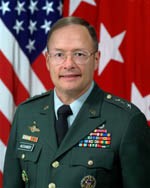WASHINGTON -- President Bush has selected Lt. Gen. Keith B. Alexander, the Army's intelligence chief, as the new director of the National Security Agency at Fort Meade.
The agency has been without a director since mid-April, when Lt. Gen. Michael Hayden left to become the first deputy director of national intelligence. That is the longest vacancy for the top post in the spy agency's history, said Matthew Aid, who is writing a history of NSA.
Alexander, a newcomer to the agency, was selected with the approval of Defense Secretary Donald H. Rumsfeld and National Intelligence Director John D. Negroponte and despite apparent reservations of Alexander's predecessor.
Intelligence community veterans said Hayden's reluctance might have stemmed from interservice rivalry.
"The Air Force looks upon the Army guys as unsophisticated users of technology," said one former intelligence official. Hayden is an Air Force officer.
Alexander, a West Point graduate and career Army officer, is described by former colleagues as open-minded and reform-oriented.
"I think he's a very good choice," said former NSA Director Lt. Gen. William E. Odom. "I think the agency has a lot of hard work to do, and he should provide effective leadership."
Alexander, who is expected to win confirmation by the Senate, inherits an ambitious modernization agenda that Hayden left unfinished. Two of Hayden's biggest initiatives are collectively about $500 million over budget and years behind schedule, according to Aid.
One of the programs, known as Ground Breaker, is an internal effort to upgrade NSA's computer systems, to improve communications with each other and other government agencies. A second initiative, Trail Blazer, is geared toward modernizing NSA's eavesdropping methods, so they can better track newer communication methods such as cell phones and e-mail.
"The basic question is to what extent he'll continue Hayden's reforms or whether he'll be more acceptable to the old guard that Hayden annoyed," said Jeff Richelson, a senior fellow with the National Security Archives at George Washington University.
If the past is any guide, said retired Lt. Gen. Bob Noonan, who immediately preceded Alexander in his three previous jobs, Alexander will continue along the reform path.
"He'll look for people who want to help continue the transformation of NSA, and then he'll move those people very quickly," Noonan said. "He'll look for people who are bright, innovative and understand what needs to be done."
Alexander's most recent project has been an overhaul of the Army's outdated intelligence apparatus to make it more responsive to the needs of soldiers in the field. Last week, Alexander announced a new program to give BlackBerry-type devices that would allow troops to tap into the latest intelligence affecting their mission.
He has focused on the importance of delivering intelligence that is "efficient, efficacious, and accurate," said Aid, adding, "that's the NSA's beat right now."
Earlier, as head of intelligence for the U.S. Central Command in Tampa, Fla., Alexander oversaw the flow of intelligence from Iraq and Afghanistan.
"He comes to a place without any fanfare," said retired Lt. Gen. Sidney T. Weinstein, a former head of Army intelligence who supervised Alexander. "He immediately wins people over. He is a man of ideas."
Weinstein noted that those serving under Alexander are sometimes surprised by his tendency to ask them whether what he is saying "makes sense" until they realize he is genuinely interested in their feedback.
No timetable has been set by the Senate Armed Services Committee for considering the nomination.
Intelligence community veterans, speaking on condition of anonymity, said the delay in filling the NSA's top job was the result of disagreements between Negroponte and Hayden over the right person to assume Hayden's old job.
Aid, however, blamed Pentagon foot-dragging. The top NSA job has typically rotated among the branches of the armed services, though the Air Force and Navy have dominated since the 1990s. Aid said the Army lobbied hard for a turn to nominate the next NSA director, but the Pentagon was reluctant to reward the Army, the military service that has been most critical of management of the Iraq war.
At a recent conference sponsored by the Armed Forces Communications and Electronics Association of Virginia, Alexander described the global campaign against terrorism as "a war of generations. It's not a war that's going to be won this month or next month."
A 1974 graduate of the U.S. Military Academy, he holds four master's degrees, including master of science degrees in electronic warfare and national security strategy from the Naval Post Graduate School and the National War College, respectively. He also earned a master's degree in business administration at Boston University.
More . . .
Home
a UFO, UAP News aggregator, featuring both current and historic reports, articles, sightings, interviews, and videos
Pages
- AARO
- AATIP
- Aliens
- Abductions
- CIA
- Chronicles
- Congress
- Crashes
- Documentaries
- DoD
- Flying Discs
- Flying Saucers
- Hoaxes
- IFOs
- Interviews
- MUFON
- My UFO Experience
- NASA
- Nimitz UFO Incident
- Orbs
- Pentagon UFO Program
- Photos
- Project Blue Book
- Project Grudge
- Radio
- Reports
- Roswell
- UAP
- Reader Reports
- UFOs
- UFOs & Nukes
- Videos

No comments :
Post a Comment
Dear Reader/Contributor,
Your input is greatly appreciated, and coveted; however, blatant mis-use of this site's bandwidth will not be tolerated (e.g., SPAM, non-related links, etc).
Additionally, healthy debate is invited; however, ad hominem and or vitriolic attacks will not be published, nor will "anonymous" criticisms. Please keep your arguments/comments to the issues and subject matter of this article and present them with civility and proper decorum. -FW